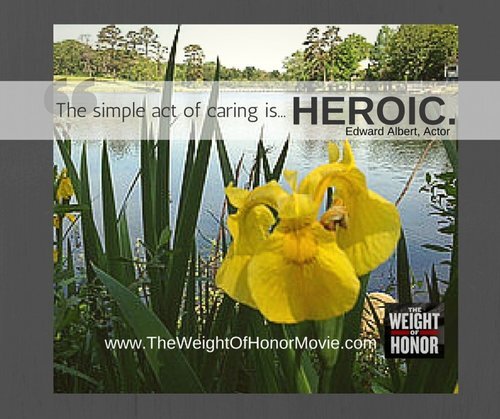PTSD Awareness Month - June 2016 - I wish it was more than ONE month.
National PTSD Awareness Month is upon us. We'll be publishing our favorite links on the subject as the month progresses. We are also adding a special "DONOR GIFT / PERK" to our IndieGoGo fundraising campaign to bring awareness and information to the issue of PTSD. But before we announce that, I'd like to share some of what I've learned about PTSD from making "The Weight Of Honor".
I’m not sure why PTSD is only getting one month of public attention. Because veterans who have PTSD, have it ALL the time.
I’ve learned in making “The Weight of Honor” that PTSD has many faces. One veteran I interviewed was constantly “scanning” for danger. The only way he could come back to the here and now was when his trained service dog put her paws on his shoulders and licked his face. Another told me his anger and short temper often emerged at seemingly little things: Fellow college students who complained they had to get out of bed and wore their pajamas to class. Or when an elderly woman fell in a crosswalk and people just passed by without lifting a finger to help her. Or when he thought someone in an airport was staring at him.
Many Caregivers experience what’s called “secondary” PTSD. It can come from staying up all night to tend to their vet’s wounds or to keep him company during HIS insomnia. I spoke with one woman who feels as if SHE was in the war. Her husband will only talk to her about what he’s been through. And now his nightmares are hers.
I’ve seen the drugs prescribed to combat PTSD. Some work. Others make life worse. It depends on the person; each is different. Which is why there is no set formula for beating PTSD. Sometimes the caregivers— spouses, parents even children— are the only ones who know what can “trigger” PTSD in their vet. Imagine “scanning” all the time for THAT.
One of the goals of “The Weight of Honor” is to increase awareness of what life is like for a military or veteran caregiver. We hope our civilian audience will understand that physical AND emotional wounds of war take their toll on families as well as our veterans.
We need to support them.
Develop programs to help cope with PTSD. Maybe not cure it, but make life more tolerable.
Thank you for your support of our film. Whether you support has been to read this blog post, share our IndieGoGo campaign with your friends and family or to make a donation. We appreciate each and every one of you. As our quote reads above - to care is HEROIC. If you can continue to care and share our mission with others, we would greatly appreciate that act of kindness. THANK YOU!


